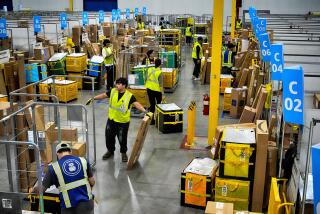Productivity Rose a Slight 0.2% Last Year : Economy: A healthy increase in the fourth quarter was enough to create the first yearly gain since 1988.
- Share via
The productivity of American workers--a key issue in rising economic tensions between the United States and Japan--rose a slight 0.2% in 1991, the first annual gain in three years, the Labor Department said Wednesday.
Productivity--the output per hour of work by non-farm employees--grew at an annual rate of 1.1% in the final three months of the year, a modest improvement over the 0.9% rate in the third quarter. The slight increase in 1991 contrasts with a drop of 0.1% in 1990 and a decline of 0.9% in 1989.
Economists said, however, that the latest figures offer little new fodder for the debate now raging between the two nations over the efficiency of U.S. workers. They attributed the productivity gain mainly to company layoffs caused by the recession. With fewer workers, output per employee tends to rise as remaining employees work harder.
Japanese officials have attacked the U.S. work ethic and raised the issue of productivity as part of an effort to account for Japan’s trade surplus with the United States. Japanese Prime Minister Kiichi Miyazawa on Monday enraged many Americans by telling Japanese lawmakers that Americans may have lacked “the work ethic.”
However, government statistics show that Americans generally outperform the Japanese in measures of productivity--generating higher product value per worker. But Japan’s productivity has steadily increased at a faster rate than that of the United States.
Increased productivity is sometimes a sign of an expanding economy. However, the United States has been mired in a recession since July, 1990, and economists attributed the slim increase in 1991 productivity to employers slashing their payrolls in the face of recession.
“The fact that productivity went up showed that businesses got rid of workers relative to the demand for their goods and services,” said Cynthia Latta, economist at DRI/McGraw-Hill.
Some economists say productivity--as a factor in economic health--is overrated. They say the nation’s economic problems stem from a lack of savings and investment rather than its workers.
“We’re paying a price for borrowing and spending too much and producing and investing too little during the past decade,” said economist David Jones of Aubrey G. Lanston & Co. That pattern shows up in the productivity data because the gains in productivity are “much too low,” he said.
“This is not a terribly impressive performance. We need to do better than that,” said Norman Robertson, chief economist at Mellon Bank.
During this recession, companies averted a productivity drop by shedding workers more quickly than usual, economists said.
But they said the recession nevertheless has taken its toll on worker productivity because of a decline in output. During the fourth quarter, non-farm output was unchanged after a 1.6% rise in the third quarter.
However, productivity gains in the U.S. manufacturing sector were more substantial. Fourth-quarter manufacturing productivity rose 1.5% after a strong 4% gain in the third quarter. For all of 1991, manufacturing productivity grew 1.4% after a rise of 2.5% in 1990.
Productivity Rebounds in ’91 Non-farm business productivity, percent change from previous year. 1991: +0.2% Source: Labor Department
Productivity Climbs Non-farm business prodtivity, percent change from previous quarter at annual rate, seasonally adjusted. 1991: 4th qtr.: Prelim. +1.1% Source: Labor Department
More to Read
Inside the business of entertainment
The Wide Shot brings you news, analysis and insights on everything from streaming wars to production — and what it all means for the future.
You may occasionally receive promotional content from the Los Angeles Times.










